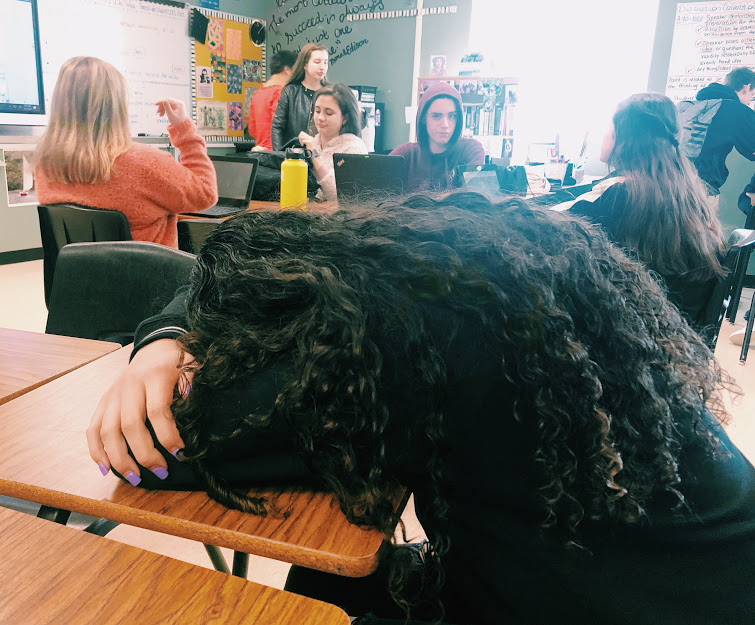Sleep Deprivation in Public High Schools
By Gabrielle Nash
How many hours of sleep do you get every night? According to Nationwide’s Children the average teenager receives between 7 and 7 1/2 hours of sleep every night. However, students should be getting between 9 and 9 ½ hours daily. Teenagers are not getting the proper amount of sleep in order to endure a full school day. This causes an absence of focus and attention towards the student’s education. This ideal is seen commonly throughout the school system and it is heavily impacting students’ performances.
Hundreds of students participate in after school clubs and sports throughout the year. Most of these activities end in the evening or at night, which creates a conflict with school work. Homework is being completed late in the night, causing students to fall asleep at extreme hours. Without gaining a specific amount of hours of sleep, the body will start running on caffeine or pure adrenaline. But eventually the high will end and the sleep deprivation will come crashing down. Sophomore Josiah Rodriguez said, “Personally, I believe that the amount of work given outside of school can affect the amount of sleep that students get. I have fallen asleep once during class and it created major consequences. It really affected my grades, due to my lack of sleep and attentiveness.” Rodriguez does not have multiple occurrences of falling asleep during school, however one time is enough for you to miss valuable information. Rodriguez is a full time dancer who faces the difficulty of balancing homework and dance. His sleep schedule is not consistent and this affects his overall schoolwork at times.
Furthermore, most students share the same emotions about their amount of sleep and their overall performance academically. Junior Caelynn Stark said, “Yes, I feel like no matter what time I wake up or how long I sleep, I always feel pretty tired in the morning. However, I feel like I am doing homework until very late most of the time.” Additionally, Stark stated, “I do not perform or focus well when I’m tired. It is very hard for me to even read a sentence and fully comprehend the material I am reading.” Stark, along with many others, do not complete their work to the fullest potential while sleep deprived. Stark spends several hours doing homework, which affects how much sleep she is getting during the night. There has been minimal times when Stark has fallen asleep, it has only occurred during free time, not instructional time, which is beneficial because she will not be missing any important information, but her comprehension is not the strongest while sleep deprived.
Lastly, sophomore Zulimar Gonzalez may have it the worst. Gonzalez stated, “I do not feel like I get enough sleep at night on a regular basis. I generally get about four hours of sleep every night. I fall asleep in class a lot and I do not focus as much as I should. I am super active, where I’m constantly writing and taking notes. I also do not do all of my work correctly, and I perform better when I get more sleep.” In this statement, Gonzalez is very honest about how sleep affects her overall educational experience. Her work suffers for the worst whenever she is incredibly tired. However, when receiving a decent amount of sleep, her performance rate is much higher. Four hours of sleep throughout a school week is really severe and fatigue will eventually develop.
To conclude, getting about eight through nine hours of sleep throughout the school week is appropriate. When students do not have enough sleep at night, this can affect their overall performance at school throughout the week. Although, after school activities and homework conflict regularly, it is important to time manage and find time to sleep. Functioning throughout school is difficult enough, adding fatigue into the equation is not beneficial for any student. So, throughout the rest of the school year, check how many hours you are sleeping, because it might just affect your overall execution.
 KNOCKED OUT! Sophomore Zulimar Gonzalez is sleeping during the end of her English class. After a late night, the sleep deprivation is finally kicking in. Photo by Gabrielle Nash
KNOCKED OUT! Sophomore Zulimar Gonzalez is sleeping during the end of her English class. After a late night, the sleep deprivation is finally kicking in. Photo by Gabrielle Nash